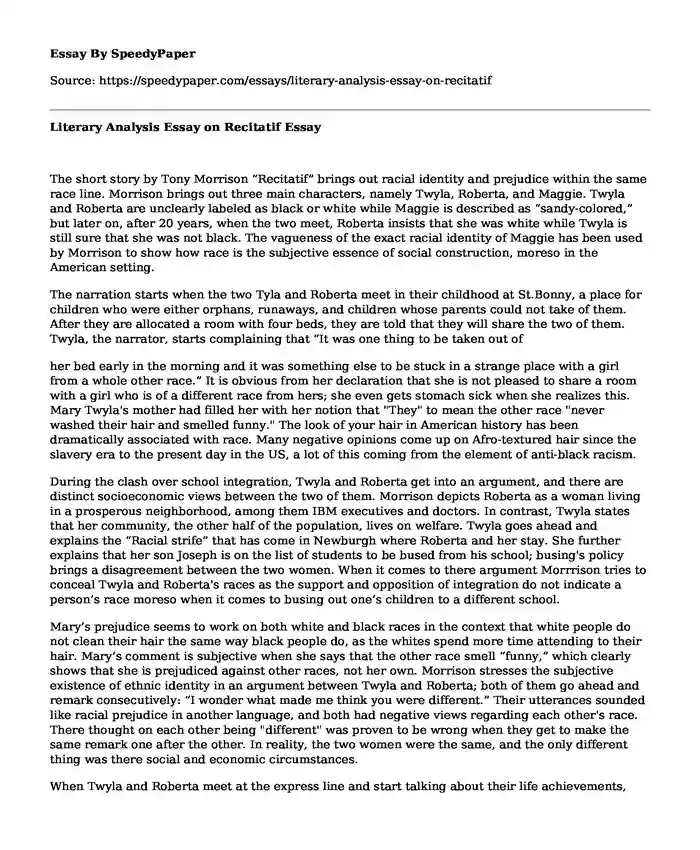
| Type of paper: | Essay |
| Categories: | Race Literature Literature review Books |
| Pages: | 3 |
| Wordcount: | 734 words |
The short story by Tony Morrison “Recitatif” brings out racial identity and prejudice within the same race line. Morrison brings out three main characters, namely Twyla, Roberta, and Maggie. Twyla and Roberta are unclearly labeled as black or white while Maggie is described as “sandy-colored,” but later on, after 20 years, when the two meet, Roberta insists that she was white while Twyla is still sure that she was not black. The vagueness of the exact racial identity of Maggie has been used by Morrison to show how race is the subjective essence of social construction, moreso in the American setting.
The narration starts when the two Tyla and Roberta meet in their childhood at St.Bonny, a place for children who were either orphans, runaways, and children whose parents could not take of them. After they are allocated a room with four beds, they are told that they will share the two of them. Twyla, the narrator, starts complaining that “It was one thing to be taken out of
her bed early in the morning and it was something else to be stuck in a strange place with a girl from a whole other race.” It is obvious from her declaration that she is not pleased to share a room with a girl who is of a different race from hers; she even gets stomach sick when she realizes this. Mary Twyla's mother had filled her with her notion that "They" to mean the other race "never washed their hair and smelled funny." The look of your hair in American history has been dramatically associated with race. Many negative opinions come up on Afro-textured hair since the slavery era to the present day in the US, a lot of this coming from the element of anti-black racism.
During the clash over school integration, Twyla and Roberta get into an argument, and there are distinct socioeconomic views between the two of them. Morrison depicts Roberta as a woman living in a prosperous neighborhood, among them IBM executives and doctors. In contrast, Twyla states that her community, the other half of the population, lives on welfare. Twyla goes ahead and explains the “Racial strife” that has come in Newburgh where Roberta and her stay. She further explains that her son Joseph is on the list of students to be bused from his school; busing's policy brings a disagreement between the two women. When it comes to there argument Morrrison tries to conceal Twyla and Roberta's races as the support and opposition of integration do not indicate a person’s race moreso when it comes to busing out one’s children to a different school.
Mary’s prejudice seems to work on both white and black races in the context that white people do not clean their hair the same way black people do, as the whites spend more time attending to their hair. Mary’s comment is subjective when she says that the other race smell “funny,” which clearly shows that she is prejudiced against other races, not her own. Morrison stresses the subjective existence of ethnic identity in an argument between Twyla and Roberta; both of them go ahead and remark consecutively: “I wonder what made me think you were different.” Their utterances sounded like racial prejudice in another language, and both had negative views regarding each other's race. There thought on each other being "different" was proven to be wrong when they get to make the same remark one after the other. In reality, the two women were the same, and the only different thing was there social and economic circumstances.
When Twyla and Roberta meet at the express line and start talking about their life achievements, Twyla comments on racial differences after seeing the Chinese chauffeur thinking its Roberta’s husband. She asks, surprised: “You married a Chinaman?” this question seems transracial and that marrying a chainman is so different from her racial ideology. In conclusion, Morrison depicts race and racism as real parts in the society today and prompts the reader to think about the internalized cues within the storyline regarding which character was black and which one was white. Concerning race, everyone should be treated equally and valued in the same way regardless of race and color.
Work Cited
Morrison, Toni. "Recitatif."
Cite this page
Literary Analysis Essay on Recitatif. (2023, Dec 28). Retrieved from https://speedypaper.net/essays/literary-analysis-essay-on-recitatif
Request Removal
If you are the original author of this essay and no longer wish to have it published on the SpeedyPaper website, please click below to request its removal:
- Free Essay on Online Shopping Intention
- Feminism Essay Example: The Perceptions, Treatment, Roles, and Achievements of Women
- Essay Example: Sacrificial Killing in Greek Mythology
- Free Essay - Corporate Social Responsibility
- Free Essay. Radicalism in Movements for Women's Rights
- Essay Sample on Ethical Issues in Advertising
- Morality in Conflict: Navigating Right and Wrong in 'Barn Burning' - Free Paper Sample
Popular categories




